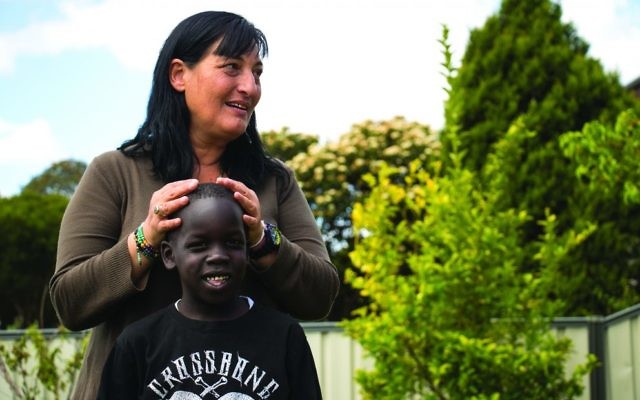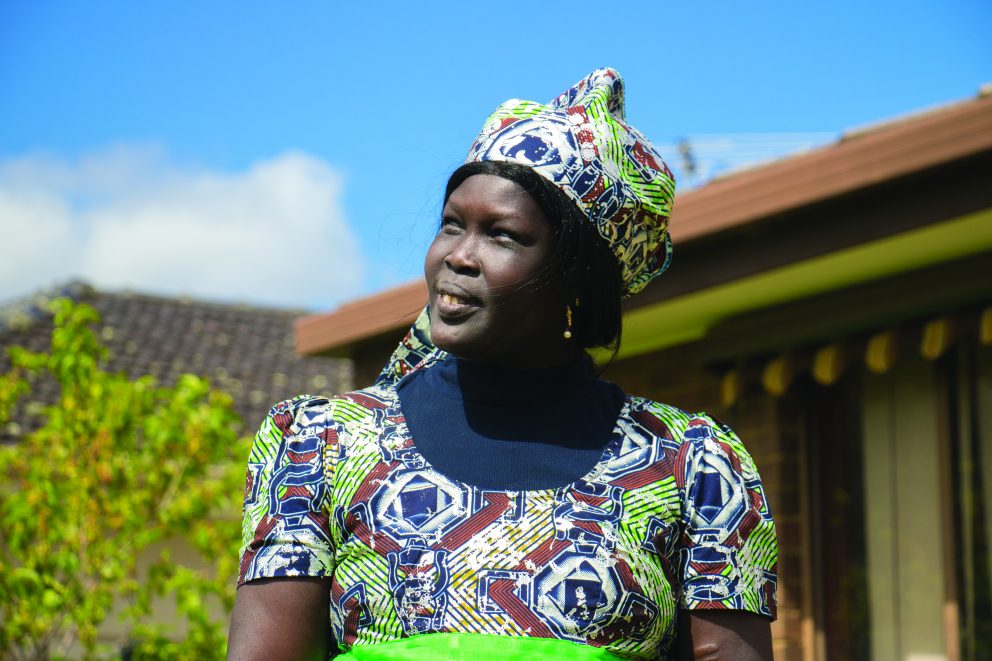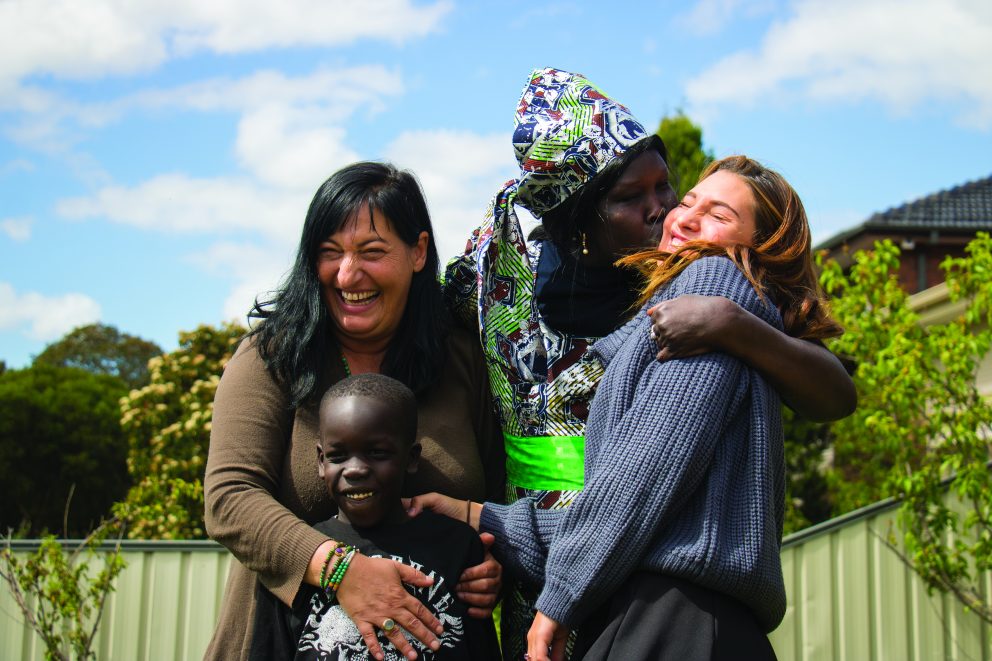The power of love and two strong women
When a Jewish woman from Israel and a Sudanese-Christian woman in Australia are brought together by their love for one child, a journey of migration and motherhood that transcends all boundaries ensues. Rebecca Davis reports.
NYANJOCK Maluel Kuel possesses a graceful calm as she meanders between her five children. Tall and elegant, she is reminiscent of an African queen as she pauses in the centre of her living room. Adorned with the bright cotton of her traditional Sudanese dress, white and green punctuates against her rich skin. “Come in!”, she beckons with a wide grin, in the midst of her children who continue to weave around her.
It is an exciting day, years in anticipation. She gathers the children, and they make their way out the front door of their home in Melbourne’s West, halting where the driveway meets the road. She is flanked by her youngest daughter and her grandson, Abram. The children each clutch a bunch of flowers wrapped in bright plastic. In silence, they watch for a car to turn into their street. It has been almost five years since they last met with Sharon Bloch – the Israeli woman who saved Abram. And now they wait.
Nyanjock and Sharon entered each other’s lives in 2012, two women who had every reason not to connect, and yet the one commonality that could have divided them, united them. The love for Abram.
“There was something very strong, from the very first minute, between me and this woman,” Sharon told The AJN upon her arrival in Australia last week.
“It was very strong and cannot be explained. And until now, I cannot explain. Because it is emotion, and that’s it.”
Nyanjock is from South Sudan. When the country succumbed to a bloody and brutal civil war, the family fled by foot. Shrouded by the cover of night, they walked, and by day, they hid in fear of their lives. For years, they traversed Africa – from South Sudan, to North Sudan, Libya to Egypt, where they were finally granted refugee status. As is culturally common, Nyanjock’s older daughter Ayom left the family to get married at the age of 15. Again, by foot, Ayom and her new husband went north, where they illegally entered into Israel, before finally settling in Tiberius with their three children. But it was there that Ayom would become the victim of a violent rape by a relative of her husband. Nine months later, Abram was born.
Twenty-four hours after his birth, Abram lay abandoned in the hospital.
At the age of 40, Sharon Bloch was desperate for another child – a sibling for her daughter, Orin.
“I don’t just dream, I do,” she explains as a look of stubborn smugness rests upon her jet-lagged face.
Sharon attempted various methods to fall pregnant, including a rigorous course of hormone therapy. After suffering serious side effects, she was advised to stop.
“I was really upset and disappointed for my body. It is a phase that is hard. Many women that can’t get pregnant, they know this feeling. I understood that I have to make myself a mother in another way.”
Fostering a child was the most viable option.
More than one year after the process towards becoming a foster parent began, Sharon received a WhatsApp picture message that would forever change her. There was nine-month-old Abram.
Sharon had been invited to Shabtai Levy, the children’s shelter in Haifa to meet her foster son.
She recalls their first meeting: “There was something very deep in his eyes. Abram has some quality in him as a listener.”
“He looked me in the eye, and I knew that he is my child. It was very instant.”
Sharon and Orin, then 8, “matched” with Abram, recalls Sharon.
“Very quickly we became a family.”
In his nine months of life, Abram had not left the children’s shelter and was insulated from the outside world.
“He was afraid of everything. Trees, flowers, the sand, the dog, the cat,” Sharon tells.
The first time that his feet touched the grass, he screamed so loudly that Sharon thought he had stung or bitten by an insect.
“He couldn’t stand it. But, while he was afraid of nearly everything, on the other side, you could see that he trusted people,” she adds.
In absolute adoration of her new son, Sharon initiated the adoption process once they reached the necessary one year milestone of foster care. However, it was at this point that she became shocked to learn that someone else, on the other side of the world was also fighting for Abram – his grandmother, Nyanjock.
Since being granted asylum in Egypt, Nyanjock, her husband and family had applied to immigrate to Australia and relocated to Perth. Unbeknown to Sharon, Ayom had told Nyanjock about Abram, before she was deported back to Sudan. Immediately, Nyanjock had sprung into action. She had flown to Canberra to organise documentation for travel to Israel to bring her grandson home.
Despite having all necessary paperwork, Nyanjock only got as far as Ben Gurion Airport, where she was detained for four days before being sent back to Australia, “because she is Sudanese”, Sharon asserts.
Nyanjock would later tell Sharon that of the many hard things that she has endured throughout her life, this was one of the most humiliating. Defiant and resolute, she returned to Australia. While, she may not have been able to read or write, her determination propelled her for a lengthy legal battle. After two years, the Israeli courts made their ruling: Nyanjock received full guardianship of Abram. Sharon and Orin would be forced to say goodbye to their son and brother.
“My first reaction was to be a victim,” remembers Sharon upon learning of the decision.
“I would think, it’s not fair! How can this happen to me?”
But after some time, Sharon had an epiphany that would change her entire outlook: when you are the victim, you have no power.
“I made a choice with myself. I knew there are only two options.
“I could go on being the poor woman that they come and take my child away, or, I could make myself another story. And that was the minute that I stopped. This is the minute as to why I am sitting here.
“I knew that I have to tell myself a positive story if I want to survive this,” Sharon adds.
Putting herself into Nyanjock’s position, Sharon realised that if she found out that she had a grandchild somewhere in the world, she too would stop at nothing to find him. And with that realisation came acceptance.
“I understood her, and respected her, and after I met her, I even loved her,” shares Sharon.
“I knew that she is a good woman, and she is doing the right thing. Even though it is painful for us, it doesn’t matter.”
In a moment of childhood clarity, Orin had added, “Okay Ima, so let’s decide that we are not losing Abram. We are expanding our family.”
At a time when it would have been so easy to be divisive, Sharon was the opposite. She opened her home for Nyanjock to stay for the close of legal proceedings. What was originally anticipated to be a period of weeks, extended to months as the process dragged on. During this time, Israeli current affairs program Uvda filmed their story leading to Abram’s highly emotional departure to Australia in November of 2013.
A few months later the film was broadcast in Israel. Ratings soared, and Israelis were captivated. Despite the immense emotional tumult portrayed, the connection forged between Nyanjock and Sharon was undeniable.
“My phone didn’t stop ringing for months. I got letters from foster kids in prison. I got phone calls from mothers, offering me their children – really,” remembers Sharon.
“I couldn’t walk in the street. People would stop the car, and go out, and cry.”
The documentary, Between Two Moms, would go on to win best documentary short film in the 2013 New York City International Film Festival.
The immediate months that followed Abram’s departure were gruelling for Sharon. She sold her chain of childcare centres, and found herself at home, “in a vacuum of emptiness”.
“But I believe that when you let yourself have a real vacuum, something new grows,” Sharon reflects.
Before long, Sharon was approached on Facebook to share her story at Shabbat dinners and community gatherings, “a cathartic experience”, she adds. Her message of positivity against the odds became contagious, as she became in high demand.
“It’s true that it is hard, and there is a lot of grief there but I don’t see it as a bad thing. Life is changed and many good things happened from it,” says Sharon.
“I believe Abram got me, and he got Nyanjock. This is Abram’s story. It is not either/or.”
While a gulf of cultural, religious and even geographic difference exists between Sharon and Nyanjock, the two women transcended boundaries, unified by their strength and compassion.
“For sure, the grounding of our connection is built on something in our personalities that is similar. There is an amazing trust between us. And trust is feeling. Feeling that comes from love.
“This is something that you can’t explain reasonably.”
Between Two Moms will be screened at 8pm on Thursday, October 19, at Beth Weizmann Community Centre.
To book, visit www.trybooking.com/309835.
For more information about Power of Women in Oz, visit bit.ly/2g7WGFj.




comments